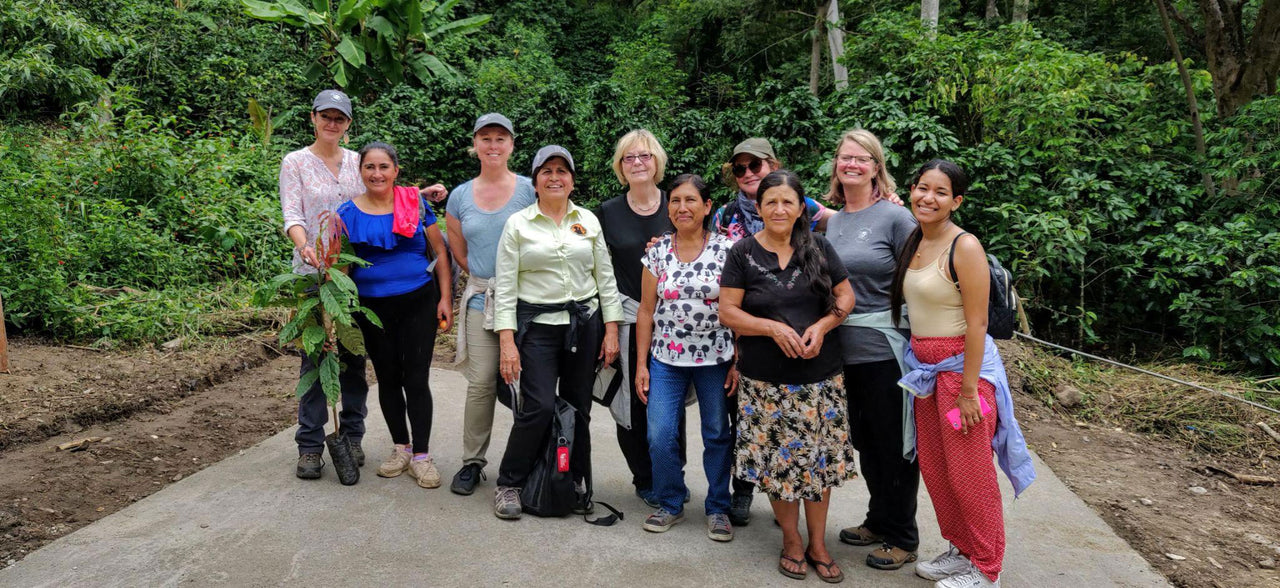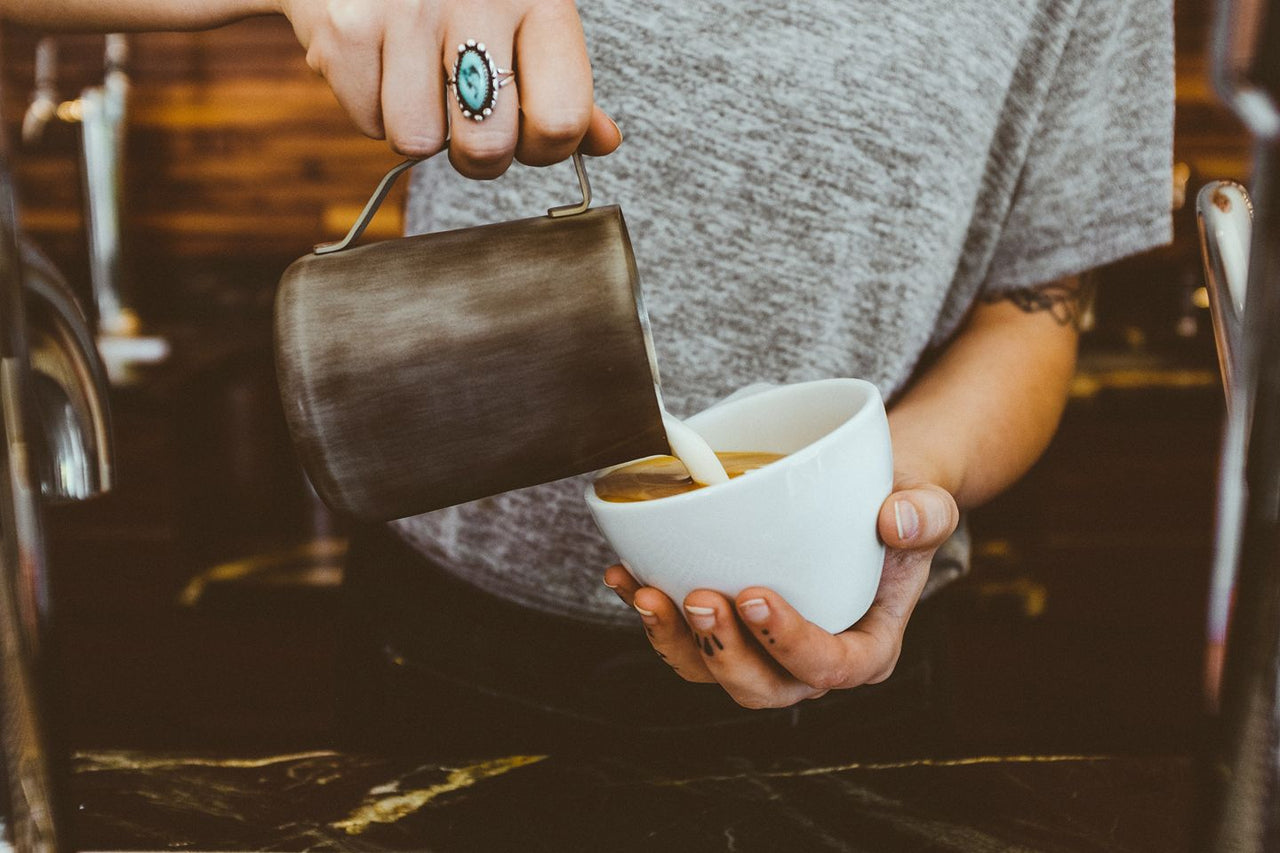Cafe Feminino, women in coffee, women of coffee, Women Owned
Interview with Café Femenino co-founder, Isabel
March 10, 2022 | Kathryn Stauffer
Cafe Feminino, women in coffee, women of coffee, Women Owned
March 10, 2022 | Kathryn Stauffer

Pictured above: Isabel (center, in green) with the Peru Café Femenino leaders
____
Isabel is the co-founder of Café Femenino. Read about it in her own words:
"The idea for this came about in 1993, we’ve really been the kind of people that are always looking for solutions to problems that we see, ever since we were young in the university, we had the fixed goal that was to see how we could contribute to improve the living conditions of the people living in rural areas and for farmers. So when we left the university, we built PROCECAP as a way to guarantee technical assistance to farmers, to help them to improve their productive systems and their organizations. But after some time, we could see that it wasn’t enough to offer technical assistance, that you could have more and more production, and improve quality, but at the end of the day the bottleneck is the market. From this position, we saw organic certification as an option, the only way that we could see to be competitive in the market. We couldn’t keep occupying the space of conventional coffee because that’s where the big companies had their expertise, but we had the idea of certifying the coffee as organic. We had difficulties, first we did it as an NGO, but problems led us to separate the commercial part form the promotional part, and we formed PROASSA with the participation of the other organizations. Later, PROASSA began organizing all of the activities, the certifications, and the commercial activities, and we were really successful at first with just the organic certification because organic coffee production was in the hands of smallholder farmers, but later the big companies began to see organic produce as a business, and they began to promote their organic programs with big farmers and low costs, so in 1997, we were in crisis again because we couldn’t compete with just organic certifications, so we looked for a social certification for the associations of producers. We did get certified in 1999, when we were able to centralize the producer organizations in a central organization called CECANOR. CECANOR was able to get the FLO certification at just the right time, right before the prices fell. It was a good moment to be able to benefit from the minimum price, and with the social premiums we were able to compete in the market, and have money for social projects, like building roads, bridges, and giving the farmers more money at the end of the year.
"When we were giving out the money at the end of the year, the idea for Café Femenino was born. Farmers were getting much more money than they ever had before, and because we had a good relationship with the farmers from attending their local meetings, we saw that another problem was incubating. A large number of the male cooperative members- there weren’t many women at the time- they were receiving their money and going out in groups to drink beer and liquor, and it was a painful situation. It had been a hard year, full of hard labor for everyone, and at the end they were just going to drink and give all of their money to the local bar.
"This was the impetus for us to see how we could use the protection from the fair trade prices directly to the family. We had some women- not many- but they were ready to separate their own coffee from the regular production, and to embrace the possibility of creating a brand of the women’s coffee, which is how we developed what is now Café Femenino. All this was done with the support of our trading company, Organic Products Trading Company.
"In 2003 we had a lot of conversations, and in 2004 we had the brand, and we exported the first 2 containers to OPTCO with a premium for the women, and we received some donations for social programs. The women were really pleased with this, and the message of working within the existing organizations, not separating women, and strengthening the organizations, was born. Members began to see what the women were earning, we won the respect of the organizations, and not by confronting the men, but rather by looking for solutions together. We’re all products of the system- we were raised this way by our parents, by school, by society, it’s not a problem of just the men. Men are not 100% responsible for the way that they act. Maybe it’s because of this gentle way of talking to them that the men didn’t oppose the program, but rather they supported it, they said that it was necessary, that it would benefit families, and now they are our primary allies. The rest is just the product of hard work- that of the women, of PROASSA, of OPTCO, of the Foundation.
"In general, men and women sell their coffee from separate plots of land. Maybe they have a few small plots of land, and they sell the coffee separately. Within the family, they give some of the plots to women, but before they would always give the less-productive plot, the smaller plot, to the women. Now they see that it is more beneficial, and they’re giving the best plot to the women- some of the men are even giving up their rights as members of the cooperative, and they’re leaving everything up to the women.
"We’ve had a lot of big accomplishments. First, developing skills for women. Before, women always sat at the back of the meetings, they didn’t speak up. Now, they sit up front, they participate, they speak up, their voice their opinions, and it has been a fundamental change. There has been another fundamental change that is hugely important, which is the improvement of family relations. Before, men felt like they had the right to have two or three women, they felt like they had the right to hit their wives, or not let them leave. Domestic violence was worse, and where cultural levels were lower, women were marginalized and subordinate to men, abuse was crueler, and things have changed substantially. It’s not like there are no instances of abuse, but instances have gone down substantially, and we can confirm that. Husbands and wives that are members of the cooperative have made a fundamental change, and there are many fewer cases of abuse than before.
"On the other hand, before, education was only for sons, and daughters were only sent to school through first, maybe second grade. Now, there is a big effort to let daughters go to school too. Before, it was rare that a farmer had a child in the university; now, more than 50% of the farmers have children in the universities. These are very important changes that we can perceive and feel within our communities.
"For me, Café Femenino represents opportunities. Opportunities to develop new skills, to be treated like full people, to be treated as equal to men, and to not be seen as less. If women haven’t achieved as much in the past, it’s because they haven’t had opportunities. These are the opportunities that Café Femenino is providing now.
"With women participating more actively in the cooperative, it’s almost 50/50 on each committee, 46% of the members are women, but in terms of participating in meetings, it’s more like 60%. The most important impact has been sustainability. There are organizations that begin, grow, and grow like foam, but then later they disappear, and we can be proud that we have associations that have been around since 1992, 1993, 1995, with long lives. There are problems, difficulties, members who leave the group, but the associations as a community institution are sustainable. One of the reasons they have been so successful has been the active participation of women. Another reason is because they have long-term vision. They are working for the next 5, 10, 15 years. They are building relationships for the long term.
"In the next 10, 15 years, I would like to see that we have improved our quality, making our number one effort the improvement of the quality of the coffee, improving the productivities, and improving household income. And it should be a holistic vision where improved household income also improves living conditions. Improved household income doesn’t always improve living conditions, but it must represent fundamental benefits for everyone in the coming years.
"In their daily lives, as a result of the Café Femenino Program, women feel treated as people, they can decide whether or not they want to go to meetings, they can make long-term plans, they have freedom that they didn’t have before. It is not just about the money, it’s about personal development, about personal growth."
